Travel outside Shelby County, and the Memphis brand boils down to two things: music and barbecue. Name the city’s music legends. (Go on. We’ll give you a minute. Jeopardy! music plays.) Elvis. Al Green. Otis Redding. B.B. King. Yes, there are many, many others. But your average Bostonian could probably guess at least one of those names.
But what about barbecue?
With a sniff of the wind, Memphians can tell if there’s a legit barbecue joint nearby, and, depending on geography, we can probably tell you which one it is and what’s best on the menu. Barbecue is a religion here, and fierce battles rage among devotees of wet ribs or dry rub or whether cole slaw belongs on a pulled-pork sandwich.
But what do we know about the minds and hands behind those rubbed ribs, those smoky butts, or those sausage-and-cheese plates? Who are the legends of Memphis barbecue?
The folks we’ve profiled here are big-name barbecue veterans. If you don’t know them, you know their restaurants — Central BBQ, Interstate Barbecue, Charles Vergos’ Rendezvous, Memphis Barbecue Company, and the Bar-B-Q Shop.
These are not the only legends of Memphis barbecue, of course. Memphians are lucky enough to have platoons of pitmasters working their magic under billowing cloaks of smoke and heat. But if you have to narrow it down to five, these folks are a good place to start.
This week’s Memphis in May World Championship Barbecue Cooking Contest will shine a spotlight on the city’s second-biggest cultural export. Expanded now to four days, the contest (which locals simply call “Barbecue”) will bring teams, swine connoisseurs, and revelers of all sorts to Tom Lee Park. Barbecue is the second-biggest weekend on the MIM calendar, behind Music Fest in the number of total visitors. But don’t tell that to the hardcore barbecue believers. To them, it’s a time to let your hair down and to celebrate that simple food that ties us all together. It’s in that spirit that we share the stories of those who made (and keep making) barbecue a big part of our city’s cultural definition. — Toby Sells
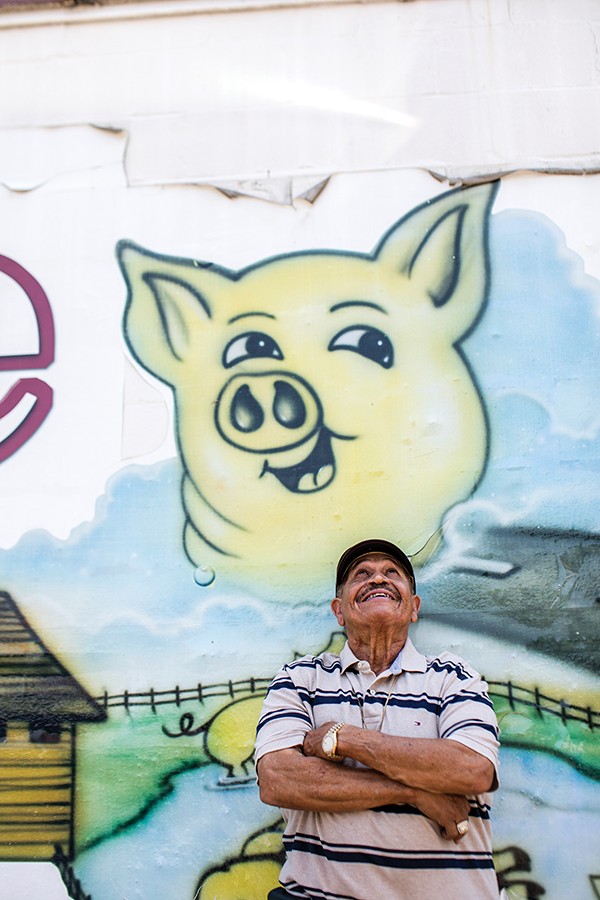
Jim Neely
Jim Neely — Interstate Barbecue
In 1979, native Memphian Jim Neely, an ex-serviceman, was in his mid-40s and operating insurance agencies in Memphis, Nashville, Baton Rouge, and New Orleans. It was a network of offices he’d developed from a single Memphis-based unit seven years earlier, and he was spending a humongous amount of time on the road overseeing them all.
Driving back to Memphis, usually late at night, he’d often find himself coping with a serious appetite, and he would think back to when he was growing up in Memphis and, as he puts it, “Every neighborhood had their own great little barbecue place.”
Not the big chains nor even large restaurants as such. Just little store fronts, each with a distinctive delectable home-grown menu. But, as Neely noticed, “By the mid-’70s, all the owners of those places had begun to die out, and the places with them.”
So, Neely decided to switch career tracks and bought a mom-and-pop grocery store at the intersection of Third and Mallory. He converted an unused space on the property into a makeshift barbecue stand, all the while experimenting with recipes in an effort to recapture the flavor of those long-gone neighborhood places.
Here it is, 38 years later, and that mom-and-pop grocery store has expanded and morphed into a state-of-the-art barbecue restaurant, “Jim Neely’s Interstate BarBQ,” as the sign on it and three other Neely-owned restuarants (in the airport area, on Winchester, and on Stateline) will tell you.
Such is their renown that most Memphis residents (and many tourists) would likely answer “barbecue” if given the name “Neely” on a word-association test. In fact, for many years some Neely nephews used the family name on a local barbecue chain of their own. But, as visitors are instructed by a sign on the side of the flagship Third Street place (“My Holy Grail,” Neely calls it), it was Jim Neely who “Put the Name in BBQ” and “Before Me There Was None.”
Everything about the Neely restaurants bears an individual touch, including the locally celebrated cole slaw, which his wife, Barbara, makes fresh every day. In the matter of cooking, Neely says, only half-facetiously, “I am like a Marine drill sergeant. There’s only one way to do things — my way.”
Neely devised his own pits, using a combination of steel plates and brick (“both fire bricks and common bricks”) and cooks with “natural gas combined with hickory wood and charcoal.” He boasts that no fire ever touches the meat, which is cooked with indirect heating via a tunnel in the pit. The process generates a natural moisture that marinates the meat, which is “tenderized in its own juices.”
Besides the various ways in which one can order and eat barbecued pork, Neely offers an elaborate menu of other items, including spaghetti, chicken wings, and beef. He takes great pride in the latter, maintaining that his was the first barbecue place in this area to offer beef brisket, and that his beef ribs, “which I get shipped in,” are twice as thick as anybody else’s.
His barbecue sauce, too, prepared from a closely guarded recipe, is the product of years of experimentation.
Neely is both a chef and the same dedicated entrepreneur he was in his insurance-business days. He’ll be 80 in October and has no intention of slowing down.
— Jackson Baker
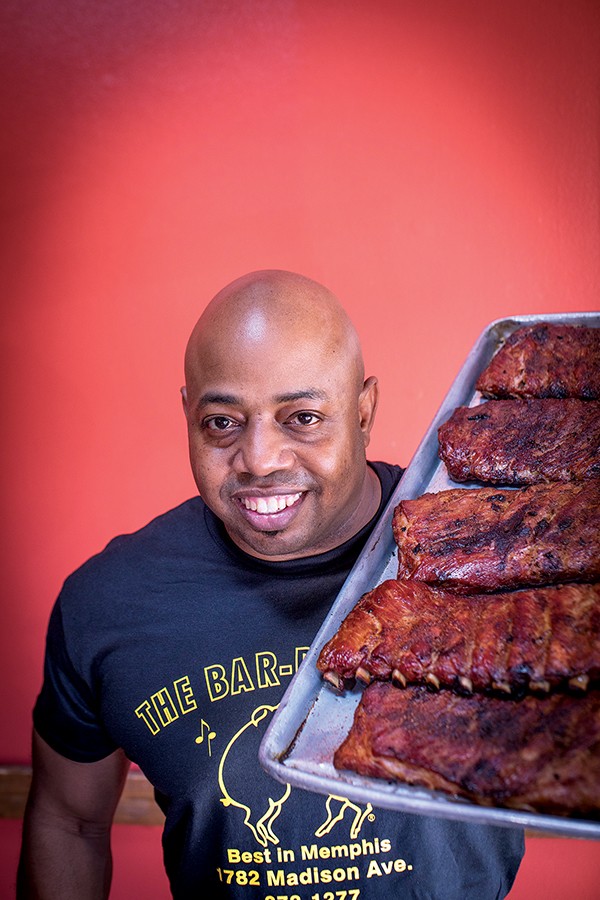
Eric Vernon
Frank and Eric Vernon — The Bar-B-Q Shop
As I’m interviewing Frank and Eric Vernon, the father-and-son team behind the Bar-B-Q Shop, Eric suddenly jumps up to greet a man coming in the door. It’s James Alexander, the legendary bass player of the Bar-Kays.
“He’s been coming here since it was Brady and Lil’s,” Eric says.
Frank Vernon says he started as a backyard pitmaster. At the time, the Vernons had their own small restaurant, called Frank’s. But Brady and Lil’s was a family favorite.
“When I didn’t cook, I would go by there and get my ribs, barbecue, and barbecue spaghetti,” Frank recalls. “It was a favorite of Willie Mitchell. All the Stax people used to go there because it was just down the road.”
Mr. Brady and Frank became close friends. When it came time to retire, he asked the Vernons if they would take over the restaurant.
“The sauce came from Mr. Brady,” Frank says. “At one time, he didn’t want to give it to us. He wanted to make it for us, which was a bad idea. We told him we wanted to think about it.”
Brady called them over to his house later. “He said, I’m just going to give you the sauce when you buy the business,” Frank said. He then signed a Bible and presented it to the Vernons, sealing the deal.
Frank tweaked the sauce recipe over the years to make it cling tighter to the ribs. Now, Eric makes more than 40 gallons per week from scratch at the Madison restaurant, and the bottled version is sold in more than 140 Kroger stores from the Missouri bootheel to the Delta. But the Shop first gained notoriety for barbecue spaghetti.
“That spaghetti has been around over 50 years,” Frank says. “It’s something unique. Everybody’s got a barbecue spaghetti now, but they don’t have the one that we have.”
The shop’s Texas Toast barbecue sandwich was Frank’s invention. He says the entire meal is carefully balanced.
“That Texas Toast and the slaw and the meat, they all complement themselves and enhance themselves,” Frank says. “I don’t care if [another restaurant] goes and uses the Texas Toast. They ain’t gonna get the same flavor.”
Frank developed a glaze for barbecue chicken and then became curious how it would taste on pork ribs. In 2015, the glazed ribs were named Best Barbecue Plate in America by the Food Network.
The Shop’s proximity to Ardent Studios has made it a favorite of musicians, from Mavis Staples to Bobby “Blue” Bland to ZZ Top’s Billy Gibson, who has a favorite table.
“DJ Paul and them would pull up in a Range Rover and order ribs with the dry seasoning, back in the day when they were recording down the street,” says Eric. “We fed Justin Timberlake’s crew when they did a concert here.”
Frank recalls when “We used to close at 2 o’clock on Monday. One Monday, at about five minutes to 2, Luther Vandross’ bus drove up. They came in here and got every rib we had in the house.”
The Vernons are consummate restaurant professionals, and it’s the loyalty of their customers that keeps them going. “The great thing about this business is when you walk out of the kitchen and see customers that you’ve been knowing for years,” Frank says. “Or you go up to a table that has never been here before, and they say, ‘This is great! Keep doing what you’re doing!’ And then you see them again.” — Chris McCoy
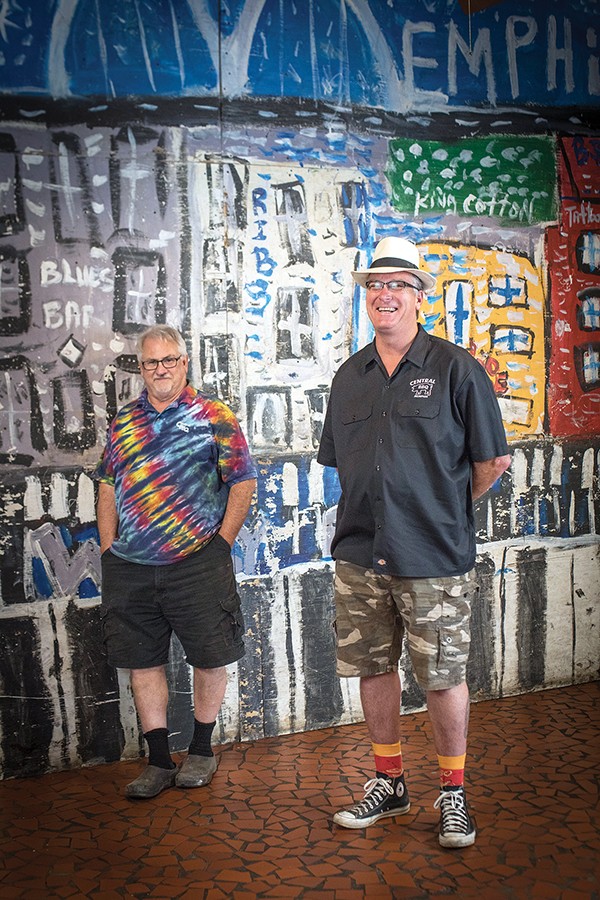
Roger Sapp & Craig Blondis
Craig Blondis & Roger Sapp — Central BBQ
Barbecue was a byproduct of kicks and cleats, says Craig Blondis, who co-owns Central BBQ with Roger Sapp.
“Roger and I knew each other from playing soccer, which is really how this whole thing started,” he says.
Both had cooked on other barbecue teams, but as members of the Vagrants soccer team, Blondis and Sapp participated together in a barbecue cooking team in the Memphis in May World Championship Barbecue Cooking Contest.
“Roger and I and all the soccer guys had a cooking team that, basically, we would enter as a Dutch international team, because a couple of guys we played soccer with were from Holland,” Blondis says.
They called the team “Keujes Van Doorenburg,” which means “Pigs from Doorenburg” says Hans Bermel, who was one of the Dutch members of the team. Bermel is now an owner of Bermel Hair Salon.
The barbecue restaurant began after Sapp bought the old Tony’s Pizza building and property on Central. He didn’t know what to do with it, so he said, “Let’s open a barbecue joint.”
A couple of high profile Midtown barbecue restaurants had closed. “The Public Eye closed,” Sapp says. “John Wills closed. Central BBQ was the perfect name,” he says, because “everybody goes up and down Central.”
The first Central BBQ opened on April 1, 2002. Blondis and Sapp later opened locations on Summer and on Butler in the South Main area near the National Civil Rights Museum.
Along with Ryan Trimm of Sweet Grass, they are currently in the process of opening Sunrise Memphis, a breakfast restaurant in the old Neely’s restaurant on Jefferson. A 250-seat event center is going to be built on property behind the Summer restaurant within the next two months, Sapp says.
Why did Central BBQ catch on so fast?
“We didn’t copy the Rendezvous,” Sapp says. “We had our own style, and we went and stuck with it.”
“We use a rotisserie convection-style pit,” Blondis says. “It’s basically gas-fed. The smoke source comes from the wood. It’s like a furnace or a heater in your house.”
They cook their ribs “dry style,” rubbing the meat with spices, then letting it marinate overnight, before smoking it.
“By doing that, you’re creating a thicker bark,” Blondis says. “You’re going to get more flavor in the bark as well. That’s really where you’re getting the smoke, but you’re also getting the flavor of the spices that are in there. And it creates a much better product.
“Sauce is meant to be an accompaniment. People who cook with sauce are hiding the fact that they’re not cooking their barbecue properly.
“Down in Helena at King Biscuit [Blues Festival] I’ve taken grand championship first place in ribs a couple of times,” Blondis says. “But my contest is opening these doors every day at 11 a.m.” — Michael Donahue
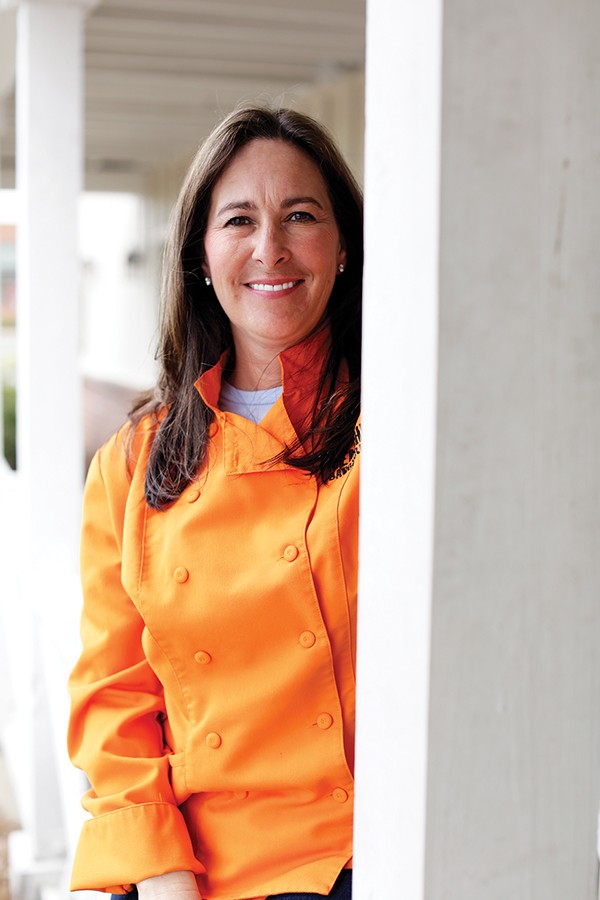
Melissa Cookston
Melissa Cookston — Memphis Barbecue Co.
It was a cold wet weekend in Greenwood, Mississippi. The tent poles had been lost, so Melissa Cookston slept on a tarp under a warm grill. She was seven months pregnant. It was her first barbecue competition.
“It was terrible,” she says.
But she’d been practicing for weeks to get up the nerve to enter, and she didn’t want to quit. She persisted, and eventually, a shaft of golden sunlight cut through the dreary scene; she and her team won fifth place in the shoulder category (the only one they entered).
“Back then, you’d have 100 teams in a small competition; it was crazy!” Cookston says, with traces of that original excitement still in her voice. “I will tell you that was like winning Memphis in May to me.”
That victory ignited a flame inside Cookston. She and her husband eventually quit their jobs to focus on competition barbecue and later opened a barbecue restaurant (Memphis Barbecue Co. in Horn Lake). Her team competed and won on TLC’s BBQ Pitmasters. Cookston was later asked to join the show as a judge for two seasons.
She’s written two books, Smokin’ in the Boys’ Room and Smokin’ Hot in the South. Along with tips and recipes, both books include Cookston’s best-known and well-earned titles, the “most winningest woman in barbecue” and “the only female barbecue world champion.”
Winning the Memphis in May World Championship Cooking Contest is, arguably, like winning the Super Bowl. Cookston’s team has won that title twice (2008, 2010). They’ve come in second (2012), won ribs (2012), and the whole hog category four times (2010, 2011, 2012, 2014).
But it was that first win on that cold, wet weekend in Greenwood that hooked her.
“Competition barbecue is an addiction,” she said. “You win, like, third place in baked beans, and, before you know it, you’re rolling down the road with a $30,000 rig. It’s terrible. It worse than crack.”
But competitive barbecue is a business for Cookston. Regular practice sessions are staged, timed, and judged just like a real cooking contest. In the past seven years, no alcohol was allowed in her MIM tent (though, she’s making an exception this year).
And this year, Cookston is coming to Tom Lee Park with a secret weapon. Over the last two-and-a-half years, she has bred, fed, and raised hogs of her own. Calling herself Frankenstein, Cookston says she cross-bred two types of hogs “to see if I could create the utopian hog for whole-hog cooking.”
Symbols of Cookston’s competition cooking success — trophies, plaques, and more — adorn the walls of her restaurant, where dozens of customers were already seated just a few ticks after noon on a recent weekday visit.
“We made a promise when we opened this place that we’d do things the right way, and we’ve kept that promise,” Cookston says. “People have appreciated it. Everybody’s happy to be eating good barbecue.” — Toby Sells
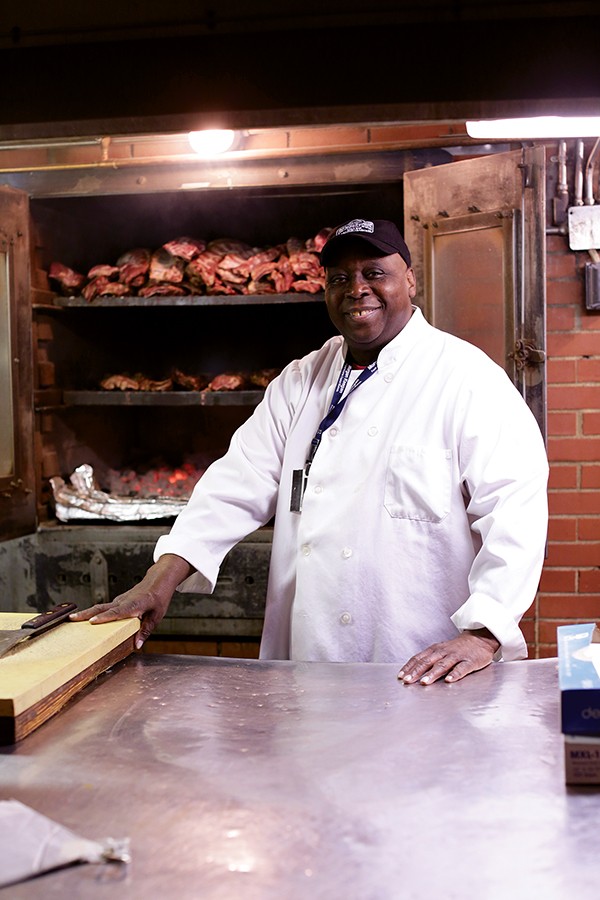
Bobby Ellis
John Vergos — Charles Vergos’ Rendezvous
Thanks to a coal chute, the Rendezvous, begun by the late Charlie Vergos in 1948, now sells 8,000 pounds of ribs five days a week.
“It started out as a tavern with ham and cheese sandwiches,” says Charlie’s son, John Vergos. “It wasn’t until he discovered the old coal chute that he started to experiment. I don’t know if it was behind bricks or what, but once he started burning something, he could see that it drew and he knew that he was in business.”
His dad had some racks built and “started experimenting with all kinds of things. Ribs were actually a by-product. They were thrown away. He would get them for 10 cents a pound.”
At that time, people ate ribs on the Fourth of July and Memorial Day. They also were sold in some grocery stores. But his dad was the first in Memphis to sell them “in a regular commercial restaurant,” Vergos says, and the restaurant still uses his father’s “exact same recipe.”
“He first started cooking them Greek style, where you baste them in lemon and vinegar, salt, pepper, oregano, and garlic,” Vergos says. “But then he went to New Orleans and got all the Cajun spices, and he mixed them together. So, that’s the same recipe we use today.”
They don’t use a barbecue pit at the Rendezvous. “They’re grilled; they’re smoked; and they’re charcoaled,” Vergos says. “It’s all happening at the same time. They’re cooked over charcoal, but the smoke’s created. So, you have that flavor. Plus, they’re being grilled.”
Asked to describe the ribs, Vergos says, “First of all, they don’t fall off the bone. We think ribs need to be chewed.” As for the taste, he says, “I love the taste. It’s not a heavy taste. Beause of the vinegar in it, it’s a fresh taste. There’s about 12 spices in our seasoning and they just all go together. The sum of the whole is much better than the individual parts. When you put it together, there’s just an indescribable taste. It’s sustained us for almost 70 years.”
People call Bobby Ellis the “pit master,” but Vergos says, “He’s not a pit master. He’s our kitchen manager. Bobby’s cooked for years and years, but now he runs the place. Bobby’s probably the most important person in the restaurant because he’s been here 46 years. He knows every outlet, every door. He knows every vendor, every maintenance person. He knows where he can get things done. I’m much easier to replace than Bobby.”
Each night, three people do the cooking at Rendezvous, Vergos says. “There are more than that working in the kitchen.”
In addition to ribs, the Rendezvous serves barbecued chicken, pork chops, and brisket. Charlie Vergos once served barbecued bear to Buford Ellington, who was Tennessee governor at the time.
“My dad didn’t realize when you cook bear meat you’re supposed to boil it first to get a bunch of fat out of it,” Vergos says. “If you don’t, once you start eating it, it expands in your mouth.” And that’s what was happening to Ellington when Charlie looked at him.
“He was turning green because he was choking,” Vergos says. “It had gotten lodged in his throat. [Charlie] claimed he invented the Heimlich maneuver because he grabbed [Buford] and pushed his chest.”
His dad was relieved when everything came out okay.
“He was just [imagining] the headlines: ‘Governor Dies. Chokes at Rendezvous.'” — MD
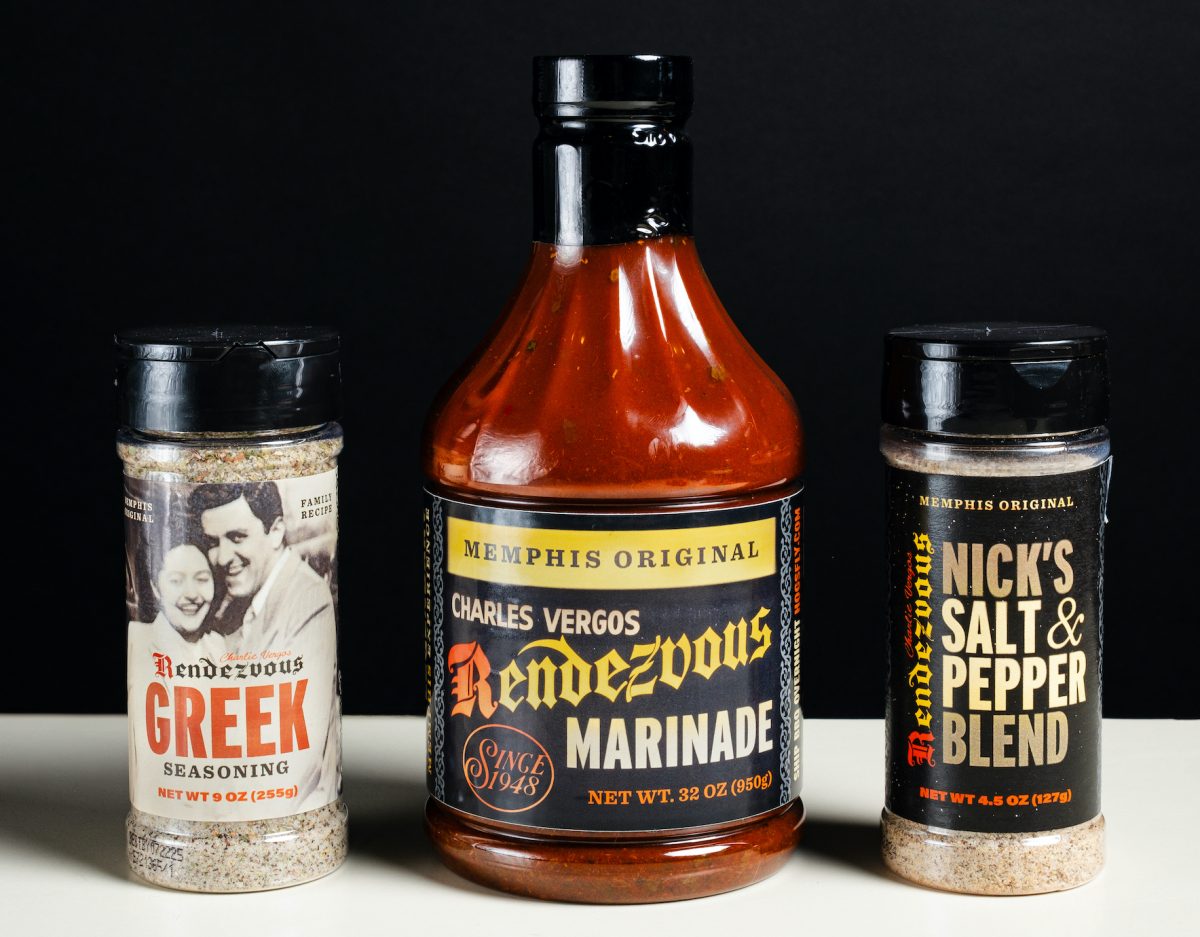
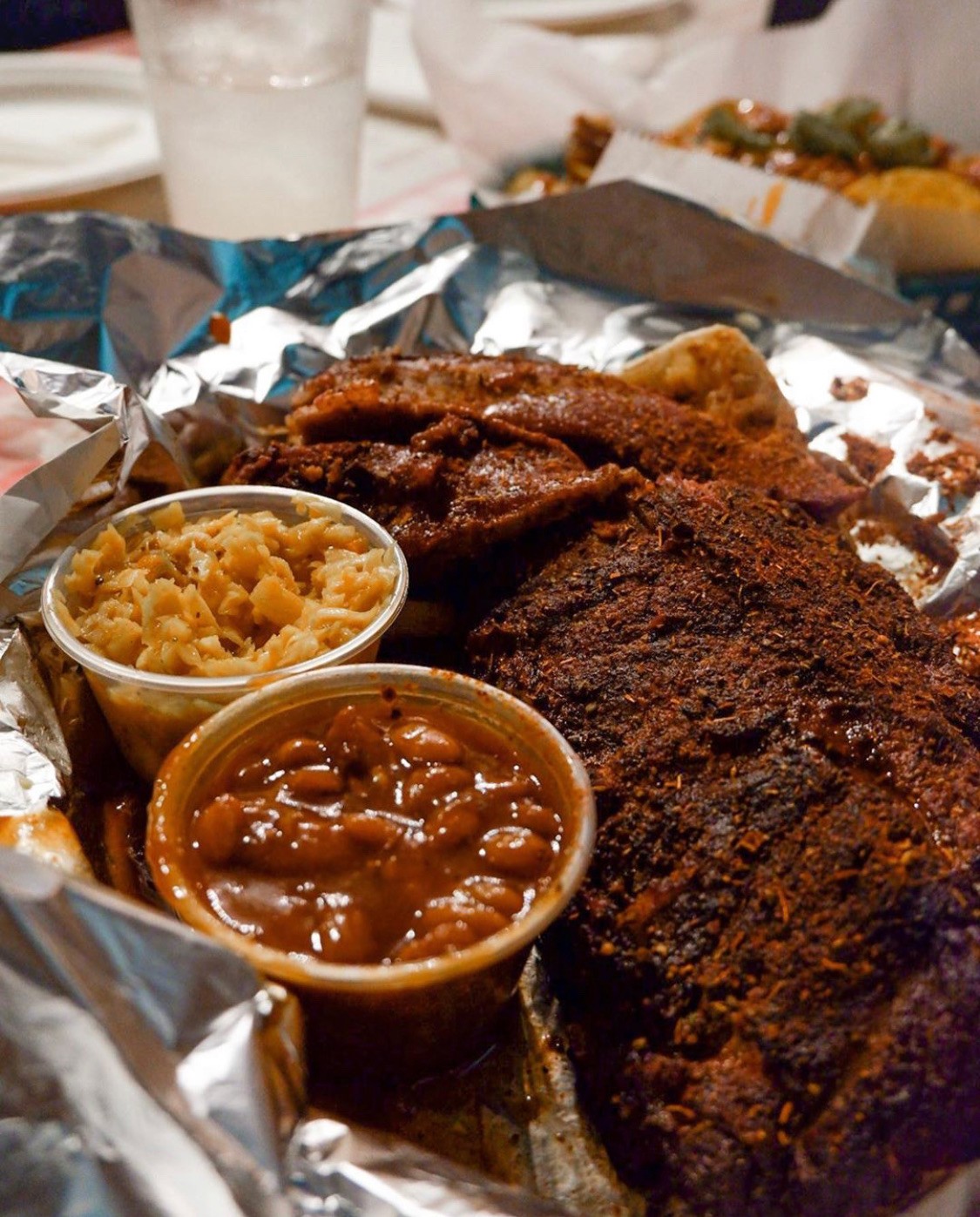 Photo courtesy of The Rendezvous
Photo courtesy of The Rendezvous  Razihusin | Dreamstime.com
Razihusin | Dreamstime.com 




